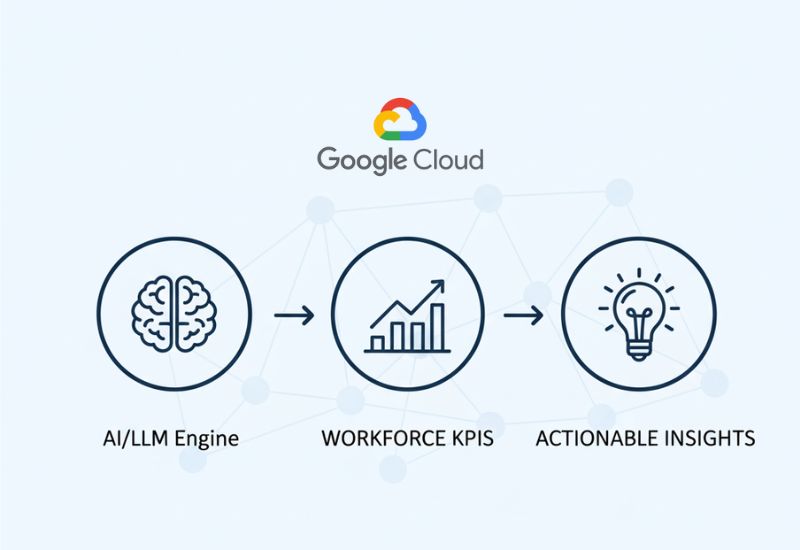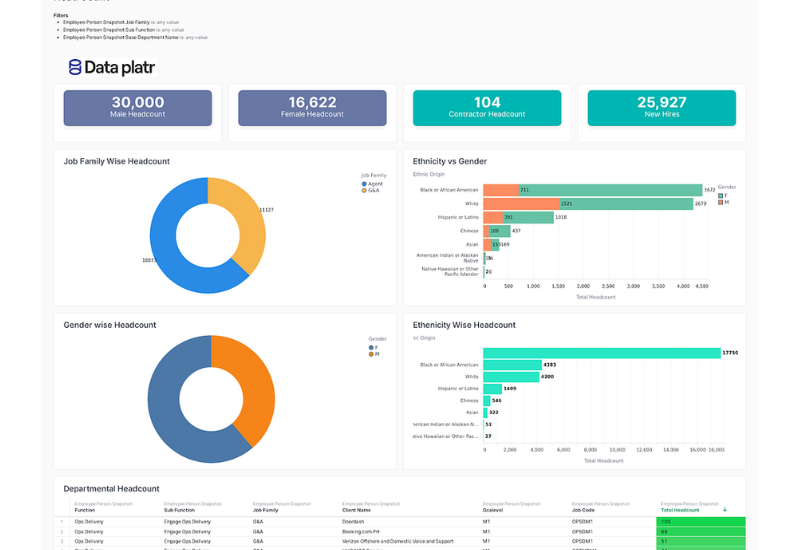Enterprise AI is reshaping how large organizations operate delivering smarter automation, deeper insights, and accelerated innovation. In 2025, companies must grasp the importance of enterprise scale AI to maintain competitive edge, reduce costs, enhance productivity, and achieve transformative business value.
What Is Enterprise AI?
Enterprise AI refers to the integration of artificial intelligence capabilities into core business functions, systems, and workflows across an organization. Unlike generic AI, which may focus on individual tasks or consumer applications, Enterprise AI is built for scale, security, governance, and business alignment.
It enables companies to automate processes, gain insights from data, and enhance decision-making using technologies like machine learning (ML), natural language processing (NLP), and predictive analytics also embedded across departments such as operations, finance, customer service, and HR.
What Is Enterprise Scale?
Before implementing AI, it's important to understand enterprise scale the ability to deploy technology solutions across a large organization with consistency, governance, and security. Enterprise-scale architectures support thousands of users, integrate with legacy systems, and comply with complex data privacy and regulatory requirements.
AI solutions must be scalable, reliable, and integrated with the enterprise's infrastructure to deliver value at this level. This is what differentiates a successful proof-of-concept from enterprise-ready AI.
Implementing Enterprise AI
The importance of enterprise AI lies in how effectively it's implemented. Enterprises need a roadmap for identifying AI-ready opportunities, selecting the right tools, integrating them into workflows, and ensuring change management.
Implementation typically follows these steps:
- Define the Business Problem - The first step in implementing enterprise AI is identifying a specific business challenge that AI can solve. Whether it’s reducing operational costs, improving customer experience, or enhancing decision-making, the objective must be clear. This ensures that AI initiatives are purpose-driven and tied to measurable outcomes. Clarity here sets the foundation for a successful implementation.
-
Evaluate AI Readiness -Before diving into AI deployment, organizations must assess their data infrastructure, technology stack, and team expertise. AI readiness also includes having clean, structured data and integration capabilities with existing systems. A maturity assessment helps prioritize gaps that need to be addressed. This step reduces risks and prepares the organization for scalable adoption.
-
Pilot and Scale an AI Model - Starting small with a pilot project allows companies to test AI models in a controlled environment. Pilots help refine algorithms, measure performance, and uncover unforeseen challenges. Once proven, the solution can be scaled across departments or geographies. This incremental approach ensures AI is both effective and sustainable at enterprise scale.
-
Train Teams and Measure Impact -Employee buy-in and capability development are critical for AI success. Teams must be trained to understand, use, and manage AI tools effectively. Organizations should also establish KPIs to track performance, ROI, and long-term impact. Regular feedback and iteration help continuously optimize AI solutions for maximum business value.
A successful implementation aligns AI outcomes with business goals such as reducing operational costs or improving customer experience.
Enterprise AI Strategy and Planning
A clear enterprise AI strategy is crucial for long-term success. This involves:
- Assessing organizational AI maturity - Understanding where your organization stands in terms of AI adoption is the first step toward building a strategic roadmap. This includes evaluating your data quality, analytics capabilities, existing automation, and internal culture toward innovation. An honest AI maturity assessment helps identify current strengths, gaps, and future readiness. It provides a baseline for setting realistic and impactful AI goals.
- Creating a roadmap for AI adoption - A successful AI journey requires a clear and phased roadmap that aligns with business priorities. This plan should outline use cases, technology selection, data needs, talent requirements, and expected outcomes. The roadmap should be flexible to accommodate evolving technologies and market conditions. Defining milestones helps track progress and manage cross-functional alignment.
- Building a data foundation - AI systems rely heavily on high-quality, accessible, and integrated data. Enterprises need to build robust data pipelines, ensure proper data governance, and remove silos across departments. Our solid data architecture enables real-time insights and supports the scalability of AI applications. Without this foundation, even the most advanced AI models can underperform or deliver misleading results.
- Identifying governance and ethics policies - AI initiatives must be built on a foundation of trust, fairness, and transparency. Enterprises should define governance frameworks that address data privacy, algorithmic bias, accountability, and regulatory compliance. Establishing ethical guidelines helps ensure responsible AI development and use. It also builds stakeholder confidence and aligns with legal and societal expectations.
Planning should be business-first, not tech-first. The key is embedding AI into the business model, not just adding it as an afterthought.
Current Business Applications of AI
Enterprise AI is widely applied across industries:
- In customer service, AI agents reduce call volume and accelerate issue resolution (e.g., Humana using Watsonx).
- In finance and risk, systems detect fraud, assess compliance, and automate ledger tasks.
- In manufacturing and logistics, predictive maintenance, supply chain optimization, and real‑time analytics boost efficiency.
- In HR and internal operations, AI automates up to 94% of routine inquiries and speeds contract drafting by 80%.
- Retail, AI-driven demand forecasting and personalized marketing
- Healthcare Predictive diagnosis and automated medical imaging analysis
- Banking Fraud detection and AI-powered chatbots
These applications not only improve efficiency but also elevate customer satisfaction and innovation.
Types of Enterprise AI
Different types of enterprise AI solutions cater to varied needs:
-
Predictive Analytics - Predictive analytics uses historical data to forecast future events or behaviors. It helps businesses anticipate trends, manage risks, and make proactive decisions. Common applications include sales forecasting, churn prediction, and demand planning. This type of AI is crucial for strategy and planning.
-
Natural Language Processing (NLP) - NLP allows AI systems to understand, interpret, and generate human language. It's used in chatbots, sentiment analysis, and voice assistants. Enterprises use NLP to automate customer support and extract insights from documents. It bridges the gap between structured data and human interaction.
-
Computer Vision - Computer vision enables machines to interpret and act on visual data like images or videos. It’s widely used in quality control, surveillance, and facial recognition. In retail, it helps analyze shopper behavior; in manufacturing, it detects defects. This type of AI can give insights from visual content.
-
Intelligent Automation - Intelligent automation combines AI with Robotic Process Automation (RPA) to automate complex, end-to-end business processes. It goes beyond simple tasks by incorporating decision-making capabilities. Examples include invoice processing, onboarding workflows, and claims management. It improves accuracy and speed at scale.
-
Recommendation Engines - These AI models personalize user experiences by analyzing behavior and preferences. Used extensively by platforms like Netflix, Amazon, and Spotify, they drive engagement and conversions. In enterprise settings, they power personalized marketing, product recommendations, and knowledge management. They add a layer of intelligence to user-facing systems.
- Agentic Process Automation (APA): AI agents orchestrate work across systems with adaptability and learning capability.
Examples of Enterprise AI in Action
Coca‑Cola: Personalized Marketing Through AI
Coca‑Cola implemented AI-driven content personalization through platforms like Adobe Experience Cloud, Adobe Real‑Time CDP, and Adobe Journey Optimizer. These tools enabled real-time, large-scale personalized campaigns, generating over 120,000 custom videos during high-profile events like the FIFA World Cup.
The company has deployed smart vending machines and Freestyle touch‑screen fountains powered by AI to analyze consumer behavior, flavor preferences, and purchase patterns leading to 15% increase in transactions and 18% fewer restocking visits in pilot deployments.
AI also helps Coca‑Cola analyze social media sentiment and loyalty data (via image recognition), enabling personalized campaigns and product innovation like Cherry Sprite and other limited‑edition flavors.
Additionally, the company partnered with OpenAI and Bain & Company to pioneer generative AI campaign creation at scale.
Benefits of Enterprise AI
The benefits of enterprise AI are multi-dimensional:
- Operational efficiency through automation - Enterprise AI automates repetitive, rule-based tasks that traditionally consume time and manpower. From invoice processing to IT support ticket triaging, AI-driven automation reduces errors and improves productivity. This helps employees focus on high-value, strategic activities. As a result, organizations experience lower operational costs and faster workflows.
- Faster decision-making with real-time insights - AI can process massive volumes of data in seconds to deliver actionable insights. Decision-makers can use AI dashboards, predictive analytics, and real-time alerts to respond to changes instantly. This empowers businesses to make informed choices quickly, reducing response time and increasing competitive advantage. Speed is a major driver of success in fast-paced markets.
- Enhanced customer experiences via personalization - AI helps deliver hyper-personalized customer experiences by analyzing preferences, behavior, and interaction history. From product recommendations to personalized support and marketing, AI ensures every touchpoint is tailored. This builds customer loyalty, increases engagement, and improves satisfaction. Personalization is now a key differentiator in customer-centric industries.
- Innovation enablement across products and services - By uncovering patterns, gaps, and opportunities in data, AI opens new doors for product and service innovation. It supports R&D, accelerates experimentation, and enables agile product iteration. Enterprises can develop smarter solutions faster and stay ahead of market shifts. AI becomes the engine of creativity and competitive differentiation.
- Scalability and agility in responding to market changes - AI enables businesses to scale their operations seamlessly without linear increases in cost or resources. It also supports agility by providing predictive models and adaptive systems that respond to market dynamics. Enterprises can pivot strategies faster, launch initiatives quicker, and better handle disruptions. AI is vital for building a resilient, future-ready business.
AI becomes a business accelerator when aligned with enterprise KPIs and transformation goals.
Risks and Challenges of Enterprise AI
- Data privacy and governance: enterprises must navigate regulations and ethical compliance.
Integration complexity: legacy systems, siloed data, and different vendor platforms complicate implementation.
- Skill and talent gaps: need for AI-literate leadership, data scientists, and skilled operators.
- Bias, transparency, and explainability: decisions from AI must be auditable.
- Adoption timelines: IBM executives predict meaningful ROI from agentic AI may take 18–24 months.
Conclusion
Enterprise AI isn't a mere buzzword, it's a transformative approach requiring thoughtful strategy, scalable infrastructure, and strong governance. By planning wisely, investing in mature platforms, and balancing innovation with ethics, organizations can achieve AI’s full potential. The future belongs to enterprises that act now and scale smartly.
Contact us at [email protected] or Book time with me to organize a 100%-free, no-obligation call
Follow us on LinkedIn for more interesting updates.



























